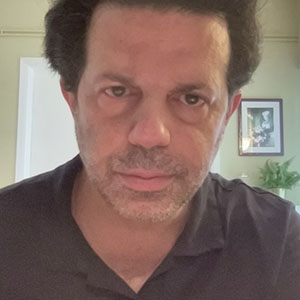
Nikolaos Kypriotakis
Country: Greece
Organization: Hellenic Focusing Center
Short CV
Nikolaos Kypriotakis has studied Physics (where he reads Physics as a kind of philosophy) and has been trained in Person-Centred & Focusing-Oriented Psychotherapy, Person-Centred Supervision and Children Focusing. He works as a Focusing Trainer for the Hellenic Focusing Center (HFC) and he is Coordinator-in-Training for The International Focusing Institute (TIFI), New York. With Judy Moore he edited the collective work Senses of Focusing, Vol. I & II, 2021, Athens, Eurasia Publications. He is the editor-in-chief of the magazine Εποχή-Epoché (Phenomenological Psychotherapies), Athens, Eurasia Publications. For two years he was the General Secretary of the Hellenic Association for the Person-Centered & Experiential Approach (HAPCEA).
Short presentation
Title: Beautiful affordances of things around me: polyphony and the bodily subject
Is the self mainly articulated by language and social relations, constructed in an externalist discursive way? Or, rather, is subjectivity mainly a natural, bodily one, a kind of continuity of organic life where a person can be a person even if they are stripped of explicit memories and virtual, semantic narrations?
IMAGINE US demented, severely impaired, naked, deprived of language, deprived of consciousness or even speech and speech acts, heavily diminished and lost in a world full of identities and verbal interactions, conflicting or mutually-excluding voices and any kind of explicit knowledge—us—incapable of self-distancing, reflection and explicit recollection—us—bodily self-familiar and unreflective—us—habits, inhabitants, habitus and lived bodies—us—almost at the limits of being considered persons. DO WE bring explicit knowledge to its limits, together with verbalities, concepts, voices and polyphonies?
US, while being still able to try to articulate in words what is the root, or the tree, where this strange fruit grows (character, personality, autobiography…), COULD WE be the (otherwise explicitly empty—and, thus, spiritual and mystical) centre of the Babylon of the polyphony of present time, but stripped of highly-ordered capabilities, just as embodied persons and selves?
Before we sink into oblivion and forget all the incorporated histories, before we sink into this vast endless field of immediate experience and all-encompassing pre-objective feeling, CAN WE give voice to this anti-voice, this meta-voice, this strange, abstract effort of (impossible) meta-language of languages, meanings and events? How can we make it simple, practical or unreflectively popular not only for everyday life but also for psychotherapies and sciences? Or is this effort doomed to fail par excellence?
How strange is it that we need explicitly to protect and define the implicit character of a person as a natural and embodied subject?

